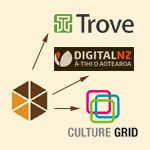
We’ve been working hard on our programming interfaces to eHive. The first part of this has now been released with the addition of support for data harvesting in the latest upgrade.
Open Archives Initiative Protocol for Metadata Harvesting (OAI-PMH)
This is a standard protocol for copying records from one system to another. It is the most common API in the cultural heritage sector for aggregating data. Aggregation refers to copying records from multiple systems (usually with each having their own website) into one central system (again, usually with its own website). Sites such as Culture Grid, Trove and DigitalNZ use OAI-PMH as one method for aggregating records from many organisations.
How the Open Archives Initiative Protocol for Metadata Harvesting works
OAI-PMH follows the usual pattern for a programming interface. There are pre-set methods (e.g. ‘Get record’ will retrieve the details of one record, ‘List records’ will search for a group of records). The response format is XML with the response content being Dublin Core. Dublin Core covers basic descriptive fields such as dc:identifier (eHive’s Object Number field), dc:title (eHive’s Name/Title) and dc:creator (eHive’s Primary Maker field). In our implementation of OAI-PMH authentication read-only access is provided only to existing public records over HTTP.
You can read more on the official site for OAI-PMH.
eHive implementation of OAI-PMH
All public records from accounts allowing third party access can be harvested using the base url “http://ehive.com/oai-pmh”
Individual accounts with public records allowing third party can be harvested using the base url “http://ehive.com/oai-pmh/accounts/[accountId]
eHive account holders can check their 3rd party access setting by going to ‘Edit My Profile > Preferences and Data Access’.
Application Programmable Interface (API)
We are close to making our application programming interface available to everyone.
Application programming interfaces (APIs) provide a way for two systems to have a conversation with each other. eHive APIs provide ways for 3rd party systems to read and optionally write information to and from the eHive servers. You can think of this as being a telephone line between eHive and other systems with a pre-agreed set of basic questions, commands and responses. Our API provides ways for other software to search for public account directory information, communities and objects, as well as reproduce functions like Explore on the our main eHive.com site. The API also allows tags and comments to be added.
Access is strictly controlled. You have to grant access to any developers wishing to connect to eHive and read the data. For example, you may grant access to a developer building your own public website which incorporates object information stored in eHive.
Full documentation of the API will be provided on a separate technical help site one the API is officially released.
WordPress Plugins
Our API forms the foundation for our eHive WordPress plugins.
These allow you to create your own websites with embedded collection search and explore functions powered by eHive. This is now in a beta phase, with several websites already launched using the plugins.
